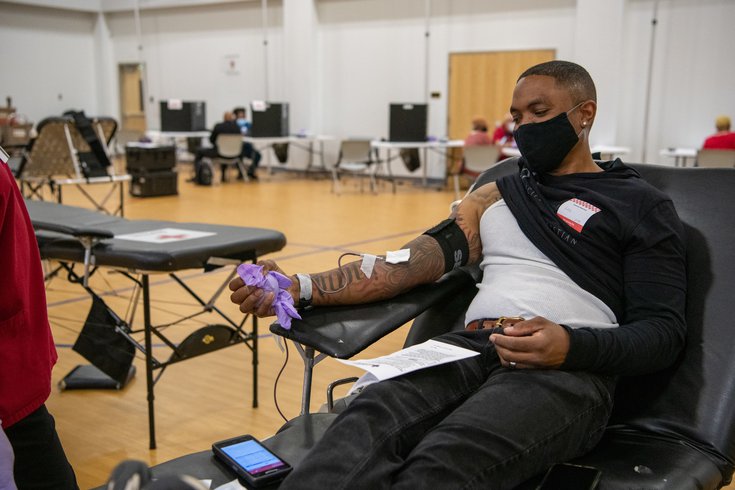
September 14, 2021
 Courtesy/American Red Cross
Courtesy/American Red Cross
Blood from a donor of the same race and blood type offers the best outcomes for patients in a sickle cell crisis, the Red Cross says. Since the majority of people with sickle cell disease are of African descent, donations from Black volunteers are in critical demand.
The American Red Cross is calling for more Black blood donors to help people with sickle cell disease.
There are over 100,000 people in the U.S. living with sickle cell disease and many of them need regular blood transfusions throughout their lifetimes.
Blood transfusions are the most effective way to manage the pain and other long-term health consequences of the inherited red blood cell disorder, the Red Cross says. A person living with sickle cell disease may need as many as 100 units of blood each year.
Blood from a donor of the same race and blood type offers the best outcomes for patients in a sickle cell crisis. Since the majority of people with sickle cell disease are of African descent, donations from Black volunteers are in critical demand.
"A closely matched blood product is critical for patients with sickle cell disease," said Yvette Miller, executive medical director at the Red Cross. "Many individuals of African descent have distinct markers/structures on their red blood cells that make their donations the most compatible blood to help patients with sickle cell disease.
"While most patients can receive blood from a donor of any race or ethnic group, due to the presence of some unique red blood cells antigens shared by people of African descent, donations from individuals who are Black are more likely to provide better health outcomes for those fighting sickle cell disease."
People who have sickle cell disease inherit an abnormal type of hemoglobin in their red blood cells, called Hemoglobin S, from their mothers and fathers. When only one parent has the hemoglobin S gene, a child will have the sickle cell trait, but usually does not develop the disease. But it may be passed on to their children.
Hemoglobin is the protein in the blood responsible for carrying oxygen to the rest of the body. Hemoglobin S causes red blood cells to become stiff and sickle-shaped. Instead of being round in shape, they look like crescent moons.
Sickle cells are sticky and can bind together, blocking the flow of blood and preventing oxygen from getting where it needs to go in the body. This causes sudden attacks of pain referred to as an acute pain or vaso-occlusive crisis that often require hospitalization and blood transfusions.
As a person with sickle cell disease grows older, the sickled red blood cells start to affect various organs, bones and joints. This can lead to acute chest syndrome, which occurs when damaged lung tissues makes it difficult to breathe. Brain complications, including stroke, are possible. People with sickle cell disease are also prone to heart damage, eye problems, and infections like chlamydia, salmonella and staphylococcus. Chronic and acute pain is common.
Since the beginning of the COVID-19 pandemic, sickle cell patients have had the added challenge of limited resources causing delays in treatment. The Red Cross wants to ensure that closely-matched blood donations are always available when patients need them.
"For someone facing a sickle cell crisis, a blood transfusion can make a lifesaving difference," Red Cross CEO Gail McGovern said.
To expand blood donation opportunities in Black communities and recruit more blood donors who are Black, the Red Cross has established new and expanded existing partnerships with the NAACP, 100 Black Men of America, Inc. and The Links, Incorporated.
Healthy volunteers can schedule a blood donation appointment at the Red Cross website or by calling 1-800-RED CROSS.
Blood donors who self-identify as African Americans also will receive sickle cell trait screening on their donations. The results are available within two weeks of the donation through the Red Cross Blood Donor App or the online donor portal on the website.
All donors and staff are required to wear masks at blood drives and blood donation centers. Vaccinated volunteers are still able to donate blood.